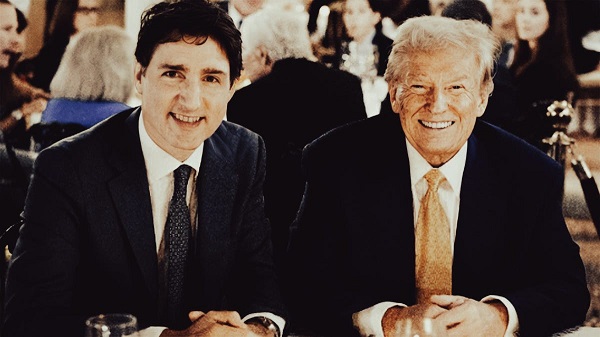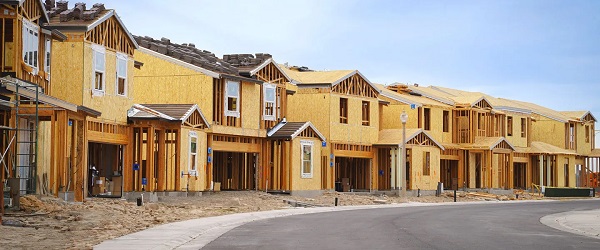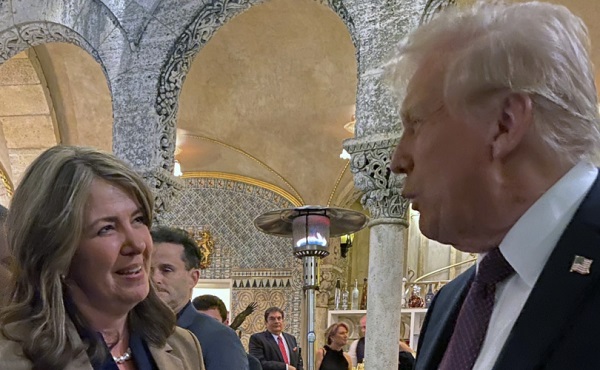Business
Out-Trumping Trump: A Mission Without a Win

From the Frontier Centre for Public Policy
Diplomacy is often a world of planned whispers and subtle signals to communicate complex messages. So, even sleepy folks noticed when the PM made a much-publicized bold (and seemingly impromptu) move and flew to Florida to play Trump-Whisperer. What was the PM hoping to get from that appearance? The best way to evaluate such diplomatic moves is to measure results against expectations.
From start to finish, the trip read like Trump’s move, when the president flew in a similarly bold and unanticipated fashion to pacify the leader of North Korea, Kim Jong-un –the “Little Rocketman.” Trudeau’s trip to see Trump was modelled on Trump’s Korean trip; it was an attempt to out-Trump Trump. That was the expectation.
Amid talk of nuclear weapons deployment, Trump surprised the world in 2017 by going to North Korea to meet with the leader of the most insular country on the planet, a man the traditional media painted as an irrational lunatic. That is not unlike the image of Donald Trump that CBC and the MSM chorus in Canada present.
Similarly, Prime Minister Justin Trudeau surprised his followers and detractors, by flying to Mar-a-Lago, the capital of Trump’s world. The purpose was not to avoid a thermonuclear war but a trade war between the two countries. Such a trade war would hurt both countries but could devastate the “vibecessing” Canadian economy, which the Trudeau government is desperately trying to perk up expecting a general election in months.

The news was leaked once the Prime Minister was in the air heading south. A flood of commentators, who pretended to have no authority to speak on the subject, began to discuss what the trip meant and how brave and bold, silly or foolish, the Prime Minister was for undertaking it. This was like the attention surrounding Trump’s journey to North Korea.
The most surprising aspect of the announcement was that Trump had previously mocked and ridiculed the North Korean leader. While we don’t have direct insight into what the North Koreans called Trump at the other end, it was probably far from flattering. Consequently, it was hard to imagine how their interactions would play out. Many argued that the two men had nothing in common, often expressing this with professorial certainty.
There is no evidence that Prime Minister Trudeau has ever called Trump any nasty names in public, but Trump has not been as careful. After the G7 meeting in 2018, Trump referred to Trudeau as being “weak and dishonest.” However, we do know that Justin’s favourite boogeyman is the American “extreme-right,” of which progressive Canadians think Trump is the godfather. Whatever Trudeau and prominent government ministers think of Trump conservatives, they also think of Trump. There are many examples of how government members weaponized the concept. In October 2024, Deputy Prime Minister Chrystia Freeland addressed criticisms from Conservative MPs by stating she wasn’t intimidated by “juvenile playground insults from the wannabe MAGA maple syrup Conservatives.” Similarly, amid discussions about Prime Minister Trudeau’s leadership in October 2024, some government members referred to Conservative Leader Pierre Poilievre as “Maple MAGA” or “Canada’s Donald Trump,” expressing platitudes about threats to democracy. Readers might also recall how every lieutenant in the Trudeau legions pretended MAGA Trumpeteers and Trump himself had crushed Roe v. Wade and then claimed Canada’s Conservatives would do the same.
The PM, too, indulged in the same kind of attack during a July 2023 visit to the Baitun Nur Mosque in Calgary. During the event, Trudeau addressed concerns among the Muslim community regarding his support for the Transexual agenda and the claims of inclusive education in schools. He quickly invoked the anti-American narrative, shaming the man who posed the question for accepting what Trudeau labelled as radical right-wing American propaganda. Trudeau suggested that misinformation about Canada’s sexual education curriculum was being propagated by “the American right-wing,” which he argued was causing unnecessary division and fear among Canadians.
Many people were surprised to see Trump attempting what others had never tried in North Korea. That reaction was akin to that of Canadians who knew what Trudeau and his cabinet had said about Donald Trump and the American right. For Prime Minister Trudeau it was a victory to show pictures of his foray into Trumpian Mordor, giving him the chance to appoint himself the hero who will stop the detonation of a 20 percent tariffs trade bomb.
Immediately following the US election, the Trudeau cabinet quickly backtracked on the Trump insults. They suddenly forgot how they were presenting Trump as the figure behind Pierre Poilievre and his “extreme right-wing politics.” This was done with the same enthusiasm that Trudeau’s critics summon when joking about his supposed genetic connection to Fidel Castro.
Trump’s visit to North Korea reduced some of the heated rhetoric between the two countries; however, the North Korean Stalinist regime remains intact, along with its nuclear capabilities. Trump and Kim Jong-un did not sign any treaty to regulate nuclear weapons or establish lasting peace between their nations. Similarly, Prime Minister Trudeau returned from Florida without any significant outcomes.
There was no joint statement or announcement of an agreement. There were promises to continue discussions, which does not constitute a victory. All Trudeau can claim is a public relations victory like the one Trump touted after his return from North Korea, and that is not insignificant. But showing that Trump was not mean to him is hardly a diplomatic victory.
Trump provided Trudeau with opportunities for photo sessions without conceding anything or making any promises. He maintained his firm demand that Canada strengthen its border security to prevent drugs and potential terrorists from crossing freely. Trump takes satisfaction in the fact that a man he despises travelled to plead with him for leniency regarding his tariff threats. He is fully aware of this dynamic.
Prime Minister Trudeau may portray himself as someone who understands Trump well, but Trump holds the upper hand. He knows Trudeau is “weak” and desperately desires to maintain himself in power, despite his low popularity. Furthermore, Trump understands that Trudeau is willing to make significant political sacrifices to achieve a seemingly favourable resolution to the border issues. Trudeau badly needs a win, and Trump knows that Trudeau is willing to jeopardize his country’s economy to win. Consequently, Trump will likely capitalize on Trudeau’s vulnerabilities for all they are worth.
Trump understands that Trudeau is the ideal Canadian leader to engage with him, which should make Trudeau the least suitable person to negotiate with Trump if Canada’s interests are to be protected.
From that perspective, Trudeau’s trip to Florida is unlike Trump’s trip to North Korea. While both leaders sought to leverage their trips for political and public relations gains, the outcomes reveal the limitations of symbolic diplomacy and Trudeau’s inability to turn the trip into a long-term win. The latter is as much a function of the PM’s lack of skill as it is of the perception among voters that he is veritably done, no matter what.
Prime Minister Trudeau believes he is the only one who can deal with Trump from a position of strength, which is incorrect. His government has gimmicks but no strength left. That is why the prime minister pleads for a Team Canada approach to Trump and quickly condemns skepticism of his abilities as a national betrayal.
Trump will take advantage of that weakness –and if he can nail a man he despises as weak and woke, he will enjoy it the more. Out-Trumping Trump for domestic advantage was a fool’s errand.
Marco Navarro-Genie is VP Policy and Research at the Frontier Centre for Public Policy. He is co-author, with Barry Cooper, of COVID-19: The Politics of a Pandemic Moral Panic (2020).
Bruce Dowbiggin
Where Carney’s Canada Now Stands : Elbows Up. Pants Down.

Our weekly Monday column is nominally a sports column. But sometimes we are lured by a sporting theme other than on the field. And with the capitulation of Mark Carney’s cringeworthy Elbows Up theme this week we can now safely reflect on the impact of the nation’s hockey obsession on tariff wars.
For those who don’t know by now, Carney’s Elbows Up meme popularized in cringeworthy commercials with actor Mike Myers was a reference to going into the corners with the legendary Gordie Howe. Legends abound on the lethality of Howe’s elbows that separated opponents from their senses. Thus, the message of Carney and Myers in Team Canada jerseys quoting Mr. Hockey was as simple as it was ridiculous.
Canada was going to go into the corner to separate Donald Trump from his tariffs? How? Carney has boasted of his hockey savvy as a goalie for Harvard. Where other nations were collapsing Carney’s Canada promised to be a stout backstop. 51st State? Hah! Locking arms with Myers and Doug Ford, Carney would show the Americans what Canadians are made of. At least that’s what they said in the election campaign to restore the Liberal brand to the nation.

The hockey theme was buttressed by the emotional victory by Team Canada over Team USA in February’s Four Nations Tournament. Having been filleted in the round-robin by the Yanks, Canada won the final game, reinforcing the nation’s dominance in a sport most Americans ignore 365 days a year. To those looking for any reason to anger Trump (hello, Andrew Coyne) it seemed like destiny for the Elbows Up crew.
As an example of the Team Canada approach Carney and his paid media wind therapists savaged Alberta premier Danielle Smith for trying build bridges with the Americans. Smith had the idea there was more to be gained from energy negotiations than from sulking. Traitor! They cried when she was seen with Trump. Consorting with the Cheeto was tantamount to selling nuclear secrets.
Elbows Up Canada, like China, would inflict counter tariffs on the U.S. after a decade of Justin Trudeau frippery. It would shut down the accusations that Canada was now a benchwarmer in global affairs. It never occurred to Team Carney or the Boomer midwits who elected him that launching a trade war against a nation whose economy was ten times the size of Canada’s might be a seriously bad idea. (Like hoping to wear down the Russian military.) Anyone pointing out this small problem was immediately denounced as hating hockey, ergo hating Canada.

To further illustrate his hockey pluck Carney’s backers bragged that the former head of the Bank of Canada and Bank of England was a skilled negotiator who would wipe the floor in negotiations with the erratic Trump. Nobody gets away with publicly declaring a post-Trudeau Canada as a failed state that should ally with the U.S. The Americans will come running to Canada when they want water, oil, aluminum, steel and maple syrup.
Then a funny thing happened. While Canada stood by, Zambonis running, ready to take it to overtime, the Americans simply ignored the taunts. Trump acted as if Elbows Up was a mirage. As trade deals were announced with other nations and international meetings convened, Carney’s Canada was left outside. In spite of the tough talk on tariffs, a blasé Trump whacked Canada with 35 percent tariffs.
The meme of Carney as a potted plant at the Ukraine White House summit came to epitomize the afterthought that is post-Trudeau Canada in this climate. Inspired by their allies at CNN, MSNBC, the New York Times and the Washington Post, Canada’s purchased media fought back with all their favoured/ debunked Russian conspiracy theories and stories of Trump’s alleged mental incapacities. To no avail.
At just the moment that embarrassment was too great for even Team Carney’s most fervent media pals, Trump last week summoned him like a call-up from the minors to be told how it was going to be. Suddenly the implacable Carney was declaring how swell it was that Canada had the best treaty in the world. Elbows Up had suddenly become Pants Down.
Of course the beaming banker acted as if it was all part of some master plan he’d worked out between periods of the game with USA. Sure, his bluster about going into the corners was all bluff, no stuff. The Master Negotiator thing was all a cover for him to reduce government spending, re-commit to the futile climate war and (don’t tell anybody) recognize Palestine as a state in the near future.
Sure. Go with that. Anyone wanting an apology from the Potted Plant will wait a long time for satisfaction. For while Liberals talk a tough game they don’t talk at all when they’re been exposed. Even more sepulchral are the media that so readily grabbed the Elbows Up hustle to defeat Pierre Poilievre. Remember the Little Trump jibes? The Sloganeer slurs? The riding defeat?
Now that Trump had blocked their righteous elbow with a right cross they’re acting as if nothing is wrong. They’re off chasing stories about Poilievre being parachuted into an Alberta riding or Trump with Jeffrey Epstein. They’re reviving the murdered Rez babies hoax. And they’re ignoring international concerns about money laundering and drug trafficking.
Anything but the utter futility of Elbows Up and the next four years of watching the decline of Canada’s formerly respected position in the world. In heaven Gordie Howe is just shaking his head.
Bruce Dowbiggin @dowbboy is the editor of Not The Public Broadcaster A two-time winner of the Gemini Award as Canada’s top television sports broadcaster, his new book Deal With It: The Trades That Stunned The NHL And Changed hockey is now available on Amazon. Inexact Science: The Six Most Compelling Draft Years In NHL History, his previous book with his son Evan, was voted the seventh-best professional hockey book of all time by bookauthority.org . His 2004 book Money Players was voted sixth best on the same list, and is available via brucedowbigginbooks.ca.
Business
Carney’s housing plan will likely spend a lot for very little

From the Fraser Institute
By Jake Fuss and Austin Thompson
The Carney government recently released its plan for a new federal housing “entity” called Build Canada Homes (BCH). Unfortunately, the plan is rife with conflicting priorities and major risks. Without course correction, Canadians could end up spending more while seeing no real progress on the housing crisis.
BCH’s core mandate is to cut the cost of homebuilding. Yet the plan would require BCH to favour Canadian-made and “net-zero” or environmentally conscious products. These goals are at odds. If a product needs a government preference to be used, it’s not the most cost-effective option. BCH won’t deliver affordable housing if it’s shackled by competing mandates. Simply put, chasing unrealistic “net-zero” targets and propping up domestic industries will drive up building costs.
To boost construction, BCH plans to use taxpayer dollars to reduce the financial risks to housing developers by providing loans, loan guarantees and equity investments for homebuilding. But slow and costly municipal approval processes remain one of the biggest sources of investment risk for housing developers. For example, developers face a 25-month wait, on average, for municipal planning approval in Toronto (compared to just 3.4 months in Edmonton). Federal spending won’t solve this problem—it will simply paper over the problem with expensive subsidies. In other words, to reduce financial risk for housing developers, the Carney government plans to stick Canadian taxpayers with the risks and costs of BCH loans and investments that may fail or underperform.
With BCH, the Carney government is also betting big on modular housing, based on the untested assumption that if Ottawa “drives demand” costs will plummet. Skepticism is warranted. If modular housing truly delivered on its promises of being cheaper, why haven’t private housing developers leapt at the opportunity? A study by Canada’s federal housing regulator found that modular housing is “no silver bullet,” noting that cost savings were uncertain and modular construction faces unique challenges related to transporting large prefabricated sections and protecting materials from weather damage.
At its core, the BCH approach rests upon a flawed assumption that the private sector cannot provide enough affordable housing. But that’s ahistorical—Canada had broadly affordable housing in decades past, provided almost entirely by the private sector. In reality, more private housing would be built today if all levels of government simply got out of the way and reduced taxes on housing development, relaxed rules on what can be built and where, and provided shorter and more certain approval processes.
Instead, through BCH, the Carney government plans to pump federal dollars into a broken housing system. Due to the shortage of construction labour, BCH projects may compete with private development rather than add greatly to the overall stock of houses—all at considerable cost to taxpayers.
Canada’s housing crisis won’t be solved by new agencies or lofty promises. On the contrary—governments should step back and let the private sector build. Build Canada Homes is yet another misguided Ottawa experiment: expensive, overreaching and ineffective.

Austin Thompson
-

 Addictions18 hours ago
Addictions18 hours agoWhy North America’s Drug Decriminalization Experiments Failed
-

 Business19 hours ago
Business19 hours agoDisney scrambles as young men reject DEI-filled franchises
-

 Alberta17 hours ago
Alberta17 hours agoGood Sense Beats Team Canada’s Hysteria
-

 Health16 hours ago
Health16 hours agoThe Hidden Risk of an Abortion
-

 Alberta12 hours ago
Alberta12 hours agoNew Calgary plant to produce luxury vinyl flooring with Alberta oil and gas
-

 Business15 hours ago
Business15 hours agoCarney’s housing plan will likely spend a lot for very little
-

 Bruce Dowbiggin14 hours ago
Bruce Dowbiggin14 hours agoWhere Carney’s Canada Now Stands : Elbows Up. Pants Down.
-

 COVID-1913 hours ago
COVID-1913 hours agoSudden deaths, incapacitations soar among COVID-jabbed airline pilots: report



